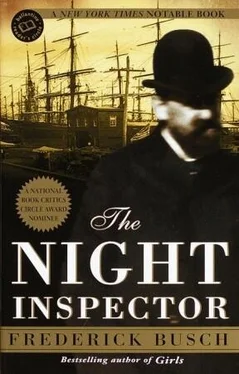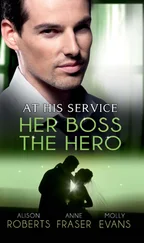I felt like someone with bonds and coin to deposit in a vault, and no bank in sight, and the need to save things powerful along my fingers and arms and in my head, and Irish Rabbits or Swamp Angels, those escaped convicts who lived in the sewers, coming toward me in the street. I smelled whatever it was they burned in a doss-house, and then I smelled stables, then the effluvium of a ditch engraved over time by the wastes that poured from a little hotel for whores and their customers who wished to rise from the streets in order to fall in rankness and disease.
I was thinking, of course — I must have been seeking not to think — of the warm, still evening in perhaps July, though it might have been August, when I walked on the toes of my moccasins to the edge of a Carolina wagon relay: raised wooden water tower, stable and farrier’s, the little carpentry shop, and, radiating out from that cluster, a wooden fence in which horses might graze. There were to have been a hundred horses or more exchanged for looted Yankee silver, so the colonel had told the lieutenant who’d instructed Grafton and me. I counted nineteen horses, a few of them hale and well fed. The others were spindle-shanked and blown. But they were horses, and they could be hitched to cannon, ridden by men, and, if need be, served up for supper. I was sitting in my firing position on the top of the water tower, waiting for a good five seconds in the sights of either the chief drover who had brought the poor animals in, or his master, a man called Wickery or Hickory, or one of the Rebel officers who had come to take possession. I counted four horses with saddles on, their reins trailing on the yellowing grass.
I was to try to bring down the architect of the robbery — he’d robbed the Union, and now he would rob the Confederacy — and then to harvest whom I could in what time I had left. I assumed now that the fellow in the suit whose hands were not on the lantern as it was lit would be the man behind the deal. He had a thick, short beard of reddish-brown, and one of his nostrils seemed to be far wider than the other. I decided to place the shot up his nose. The lamp was set down, then adjusted; it flared, it subsided, an orange light slanted across the neck and then nose of the dealer as he bent to light his cigar at the chimney of the lamp. All right, I thought: I’ll go down your nose instead of up. I should have apologized to him for taking him in an awkward stooping position while thinking derisively of his nose.
I did not apologize. I fired.
His forehead and nose blossomed, he leaned backward and I saw his devastated face, and then he went over. I loaded and aimed at the officer who crouched to the right of the table. I had him. But the charge failed. They began to fire wildly from the window, but upward; either they had sensed the origin of the original shot or they had been warned that I might be about. If so, what could have brought them to a lighted lamp in the frame of the window — a picture they posed for the transporter of their deaths?
I went down the ladder on the far side of the tower, and I propped the Sharps to recover when I was finished. I walked, as far as I can reconstruct it now, into their fire. A ball took off my hat, and something tugged my shirtsleeve. I drew the Navy Colt and, aiming it as best I could while I strode toward them, I fired deliberately, sighting this time with both eyes so that I could perceive their relationship toward my changing position.
When I was out of cartridges, I took them singly from the pouch I carried in my pocket (to distinguish them from the rifle ammunition in my leather pannier), and I reloaded three or four cylinders. I had no more time. I had been struck above the belt, on my left-hand side, though I could not tell then how deeply I had been explored by the shot. I held the Colt at arm’s length and I fired and fired and fired as I walked to the window. I did not stop, I was surprised to learn. I stepped up and through the window, kicking aside the table and the lighted lamp. I stepped upon the first man I’d shot and went around the drover and the Rebel corporal who had come along to assist the officer, who stood propped against the far wall. He was slight and young, but unafraid. He was angry at me. He was raging, but he was also respectful. He stood and bled and shook.
“You murdered me,” he said.
“I murdered them so far,” I said, moving closer while he shot with his pistol and missed me. I said, “I haven’t even aimed at you.”
“You’re the one put this in me,” he said. His thigh was bloody, and the leg seemed ready to buckle.
“I didn’t know it,” I said. “I was just firing.”
“For just firing, you mule-jism bastard, you did plenty of harm.”
He brought his weapon up and fired and the hammer clattered down. “I’m out,” he said. “I knew so. Oh, bastard, my leg hurts. I just wanted you to think, one time, you might die.”
“That,” I said, “I do think, every time out. If it’s any consolation.” I brought my Colt up and the hammer landed on an empty cylinder.
“Both of us,” he said. “Maybe we should leave each other to go our ways, then?”
He wasn’t begging. He preferred not to die, but he was brave enough. His leg collapsed, and after he’d hit the floor, he slid his sound leg out from under him and sat against the wall as if he’d chosen to.
I took the knife from my belt and I stooped as I stepped forward, thinking to do it quickly for him, and I stabbed him in the throat. The worst part was pulling it out as he gurgled and squealed with the pain of the blade coming back at a slightly different angle from its entrance. Blood geysered, for I had struck an artery, and I hated for him to have to watch it pulse out and up. He made a face of defiance, of disgust for me, and then he grew paler and more fatigued and closed his eyes. He would die in a minute or more.
I called down, as if he might take the words with him, “You were good. You were a stubborn soldier, do you hear? You were good.”
He shook, as if with an ague, as if in the cold of an arctic night and not this moonless, windless summer dusk. His face was the dreamy, lost face of a boy deep asleep. The metallic smell of his blood was on my arms and hands and trouser legs. Then his bowel gave out the last that we leave in the world when we go: our embarrassment, our shame, the least of all of our aspects. He shook and his unwounded leg bounced upon the floor and then was still, and so was he.
“Plenty damned good,” I said. I collected what papers I could find on the table and the floor. Outside, I grabbed for the horses’ reins, but the stink of blood on me must have spooked them. They danced a dozen yards away and then, because they were trained and their reins were trailing, they stopped to wait. The only way I could keep them still so I might search the saddlebags for the silver I’d been told to retrieve was to reload my pistol and kill each one of the four. I searched with my hand for the cartridge pouch, and I found it; I had enough to load five cylinders with two more left.
But, you must think, I surely had to have been exhausted. I was. Might not I have been shaken by the battle? Absolutely. And, within it, the slaughter? Of course. And the death of the brave young man? And that without doubt. So that I rebelled at the killing of the mild, obedient horses?
I shot them down by holding the pistol in both hands and squeezing off as I saw those gentle, obedient eyes find me and look head-on; the sound was crunchy and slamming at once. I killed two with my first two shots; one ran off, then turned, as if in disbelief, and I shot him, too. The other I missed. He ran on, past the farrier’s, and I found I hadn’t the kidney any longer for a crippling shot and then the one with which to dispatch him. Only one seemed alive as I came up. He shuddered and looked to me as if — it was his training, after all — I brought reason and procedure and relief. I reloaded, standing above him while he watched, and I put the coup de grâce into the bony head of the sweet, betrayed creature. I went to the next one, and then to the farthest, and did all, at that moment, that I could: squeezed a shot away. The first one I’d taken had the bag I sought, a small canvas valise such as an artisan carries his tools in. I wondered what I would have done if the horse had pinned the bag beneath him. I thought of my knife. I thought of me in the geysering blood as I butchered the horse, hacked at him with axes from the woodworker’s shop, sawed at his ribs, fell to above and within him with a mallet and chisel, until I had torn him apart and had fetched the bloody bag on which he’d lain. Instead, I cut the pigging string away from the handle of the valise, put away my revolver, stopped at a watering trough to rinse off the blade of my knife, and carried the valise toward the Sharps I’d left at the water tower.
Читать дальше












